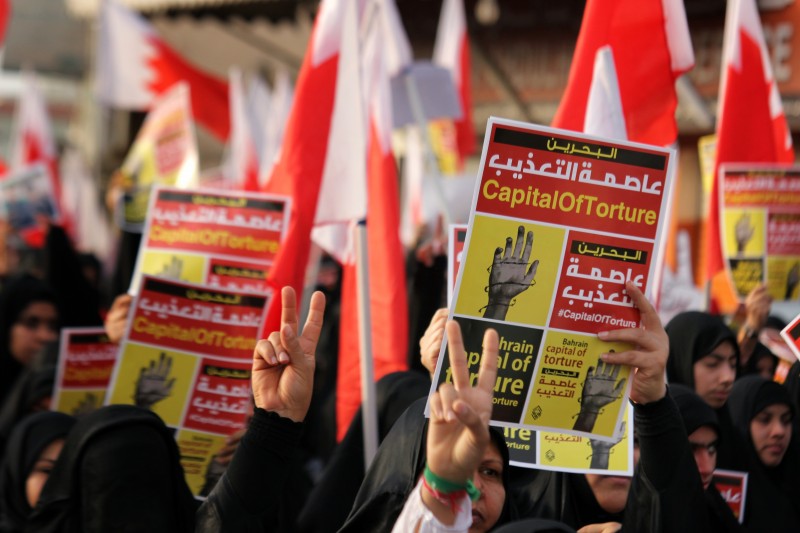
A poster at an opposition rally in Bahrain in May 2013 describes the country as the “capital of torture.” Photo by Ammar Bin Yasser. Copyright Demotix
Bahrain has denied countless international journalists entry into the country amid a fierce crackdown on anti-regime protesters. Over a hundred people have been killed and thousands jailed since protests broke out in February 2011. The ruling Sunni monarchy has stifled free expression — and continues to do so.
It's no wonder then that a tweet by Bahrain's Foreign Affairs Minister Khalid Alkhalifa on the double standards employed by the international press in covering the latest Israeli assault on Gaza would raise more than a few eyebrows.
Following the recall of NBC's reporter in Gaza Ayman Mohyeldin, Alkhalifa tweeted:
رأى الجريمة بعينيه .. و لم يتحملوا صدقه و أمانته في مهمته الإعلامية . فابعدوه عن غزة . لله درك يا أيمن @AymanM #غزة pic.twitter.com/RMdX4Tnc28
— Khalid Alkhalifa (@khalidalkhalifa) July 17, 2014
He witnessed the crime with his own eyes.. and they couldn't handle his honesty in doing his journalistic duty.. So they kicked him out of Gaza
Mohyeldin was recalled by the channel after he tweeted about the death of four boys on the shores of Gaza, and his Twitter and Facebook posts about the tragedy were deleted. Journalist Rania Khalek, who has more than 40,000 followers, tweeted screen captures of the posts:
These factual posts, which went viral, have since been deleted. Seems like @NBCNews censored their reporter… pic.twitter.com/QEhTbd07cs
— Rania Khalek (@RaniaKhalek) July 17, 2014
The decision by the network angered many journalists, and Moheyeldin was eventually reinstated.
However, the tweet from Foreign Minister Alkhalifa didn't go unnoticed.
Said Yousif, vice president of the Bahrain Center for Human Rights who lives in Germany, replied:
@khalidalkhalifa @AymanM كما ان قبيلة الخليفة طردت صحفيين من البحرين لانهم شهود على جرائم و اعتقلت العشرات من الشهود على جرائمها ضد المدنيين
— S.Yousif Almuhafda (@SAIDYOUSIF) July 19, 2014
Just like Al Khalifa kicked journalists out of Bahrain for witnessing crimes and arrested dozens of witnesses to its crimes against civilians
The account Bahrain Doctor, which calls for the release of detained medics in Bahrain, tweeted to its more than 62,000 followers:
@khalidalkhalifa @AymanM ١- انت اخر واحد يتكلم عن حرية الصحافة فقد منعتم المئات من دخول البحرين والأكثر من ذلك أنكم عذبتم الصحفيين البحرينين
— BAHRAINDOCTOR (@BAHRAINDOCTOR) July 19, 2014
You should be the last to talk about the freedom of the press, you have banned hundreds from entering Bahrain and what is even worse is that you tortured Bahraini journalists
Non-governmental organization Bahrain Watch has documented hundreds of cases of journalists and activists being denied entry into Bahrain. Pulitzer Prize-winning New York Times columnist Nicholas Kristof, who said he was tear-gassed and briefly detained in 2011 while covering the anti-government uprising, was deported shortly after flying into Bahrain's airport in 2012. After the country expelled U.S. Assistant Secretary of State for Democracy, Human Rights and Labor Tom Malinowski, who had met with a Shiite opposition group in Bahrain, Kristof tweeted:
Then again, being banned in Bahrain is kind of a 21st century King Hamad Human Rights Award. They should give certificates.
— Nicholas Kristof (@NickKristof) July 7, 2014
Journalists arrested in Bahrain have also accused authorities of torture. Nazeeha Saeed, a Bahraini correspondent for France 24 and Radio Monte Carlo, detailed being severely beaten and tortured in police custody two years ago in a haunting personal account for the Media Legal Defence Initiative. Freelance photographer Hussain Hubail, who said he was tortured while in custody, was recently sentenced to five years in prison for “inciting hatred of the government” and other charges, according to Reporters Without Borders.
On Twitter, the account Bahrain Doctor tweeted at the foreign minister with a reminder about Saeed's case:
@khalidalkhalifa @AymanM ٢- وكمثال بسيط أقراء ماالذي فعله المعذبين في معتقلاتكم للصحفية نزيهة سعيد ان كنت قد نسيت https://t.co/MgJv5eVIBs
— BAHRAINDOCTOR (@BAHRAINDOCTOR) July 19, 2014
As a simple example, read what torturers in your detention centers have done to journalist Nazeeha Saeed, in case you have forgotten
Ahead of the United Nations Human Rights Council’s 26th Session in June, 10 organizations that fight for human rights and freedom of expression put out a renewed call for the release of journalists detained in Bahrain, including Hubail. So far, Bahrain hasn't answered it.






